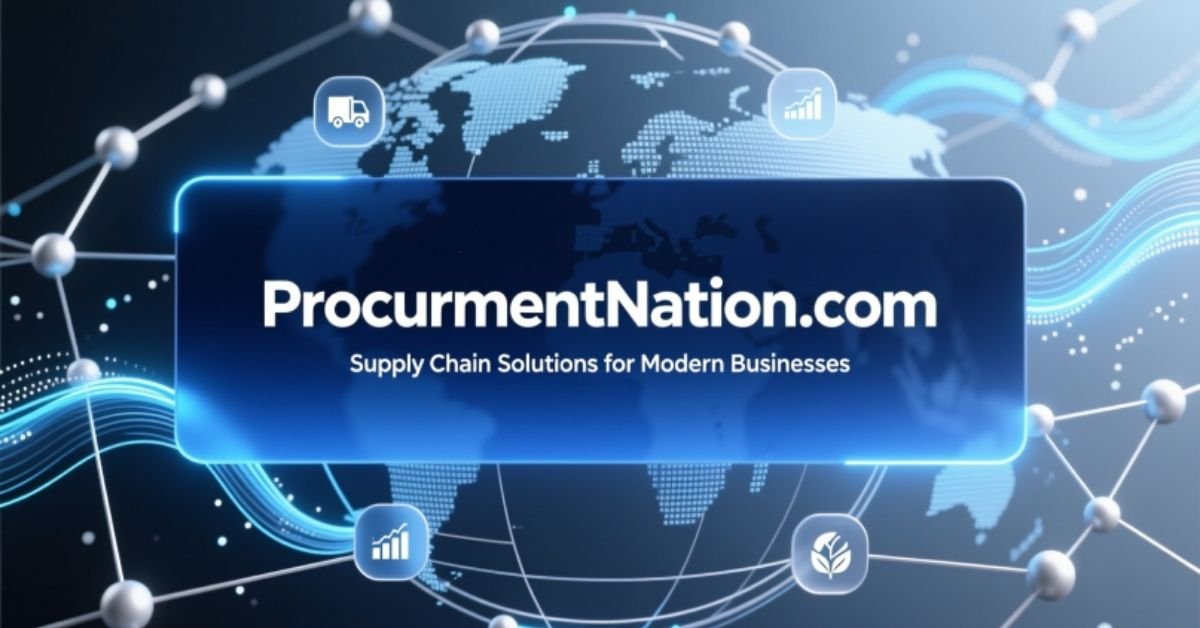In today’s fast-paced business environment, managing a reliable and efficient supply chain is more critical than ever. Companies are constantly seeking platforms that simplify procurement while ensuring transparency, cost-effectiveness, and scalability. One such solution gaining traction is ProcurementNation.com supply chain—a digital ecosystem designed to connect buyers with vetted suppliers, automate purchasing workflows, and enhance end-to-end visibility across the procurement lifecycle.
ProcurementNation.com acts as a bridge between businesses and global suppliers, offering tools that support everything from request for quotations (RFQs) to contract management and delivery tracking. Unlike traditional procurement methods that rely heavily on manual processes and fragmented communication, this platform centralizes operations, reducing errors and delays. For small and mid-sized enterprises especially, leveraging a digital procurement hub like ProcurementNation.com can level the playing field against larger competitors with more resources.
At the heart of ProcurementNation.com supply chain functionality is its supplier network. The platform carefully vets vendors across industries—ranging from raw materials to finished goods—ensuring quality, compliance, and reliability. This pre-qualified network saves buyers countless hours otherwise spent on supplier research, background checks, and negotiations. Additionally, the platform often includes features like real-time inventory updates, automated purchase order generation, and performance analytics, which empower procurement teams to make data-driven decisions quickly.
Another standout aspect of ProcurementNation.com is its focus on collaboration. Buyers and suppliers can communicate directly through the platform, share documents securely, and track order status in real time. This transparency not only builds trust but also minimizes misunderstandings that can lead to costly delays or quality issues. Moreover, integrated payment gateways and compliance documentation tools further streamline the transaction process, making cross-border procurement less daunting.
To better understand how ProcurementNation.com supply chain services compare with conventional procurement approaches, consider the following key differences:
| Supplier Discovery | Manual research, referrals, trade shows | AI-powered, vetted global supplier directory |
| Communication | Email, phone, spreadsheets | In-platform messaging and file sharing |
| Order Tracking | Limited visibility, frequent follow-ups | Real-time status updates and alerts |
| Cost Control | Reactive budgeting, hidden fees | Transparent pricing, automated cost analysis |
| Scalability | Difficult to scale quickly | Easily adapts to business growth |
Businesses using ProcurementNation.com often report significant improvements in procurement cycle times—sometimes cutting them by more than 50%. This speed-to-market advantage is especially valuable in industries like retail, manufacturing, and e-commerce, where timing directly impacts revenue and customer satisfaction. Furthermore, the platform’s analytics dashboard allows procurement managers to monitor KPIs such as on-time delivery rates, spend per category, and supplier performance scores, enabling continuous optimization.
It’s also worth noting that ProcurementNation.com supply chain solutions are designed with cybersecurity and data privacy in mind. Sensitive information—such as pricing agreements, contracts, and shipment details—is protected through encryption and role-based access controls. This reassures businesses that their procurement data remains secure, even when working with multiple external partners.
For companies new to digital procurement, onboarding with ProcurementNation.com is typically straightforward. Most users can set up their profiles, connect with initial suppliers, and place their first orders within days. The platform often provides onboarding support, training resources, and customer success managers to ensure a smooth transition from legacy systems. Over time, as more transactions occur on the platform, the system learns user preferences and can even suggest relevant suppliers or flag potential risks—such as a supplier’s delayed shipment history—before a purchase is finalized.
Ultimately, the value of ProcurementNation.com lies in its ability to transform procurement from a back-office function into a strategic asset. By digitizing and optimizing the supply chain, businesses gain agility, reduce operational friction, and free up internal resources to focus on innovation and growth. In an era where supply chain disruptions are increasingly common—from geopolitical tensions to climate-related logistics challenges—having a resilient, tech-enabled procurement strategy is no longer optional; it’s essential.
Whether you’re a startup sourcing your first batch of components or an established enterprise managing a complex global network, exploring what ProcurementNation.com supply chain tools offer could be a pivotal step toward building a smarter, more responsive procurement operation.
Frequently Asked Questions (FAQs)
1. Does ProcurementNation.com support international shipping and customs documentation?
Yes, the platform integrates with logistics partners and provides tools to manage international shipping, duties, and customs compliance.
2. Can multiple team members collaborate on a single ProcurementNation.com account?
Absolutely—ProcurementNation.com allows role-based user access, so procurement teams can collaborate securely within one account.
3. Is there a mobile app for ProcurementNation.com?
While availability may vary, many users access the platform via responsive web design on mobile devices, and some versions offer dedicated apps.
4. How does ProcurementNation.com verify supplier credentials?
The platform uses a combination of third-party audits, document verification, and performance history to vet and continuously monitor suppliers.
5. Are there industry-specific features on ProcurementNation.com?
Yes, ProcurementNation.com tailors its supply chain solutions to sectors like healthcare, construction, and food services, offering specialized compliance and sourcing tools.

